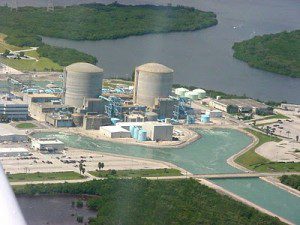
State regulators Monday approved allowing Florida Power & Light and Progress Energy Florida to collect nearly $300 million from customers next year to help upgrade decades-old nuclear plants and to take steps toward building new reactors.
The state Public Service Commission unanimously approved the proposals, which will lead to FPL customers paying about $151 million and Progress customers paying about $143 million.
Spread out over millions of customers, the costs will have a relatively small impact on monthly electric bills: For example, an FPL residential customer who uses 1,000 kilowatt hours of electricity a month will pay $1.69, while a similar Progress customer will pay $4.79, according to Public Service Commission numbers.
But nuclear-project costs have been a highly controversial issue in recent years, at least in part because FPL and Progress are collecting money for new reactors that likely will not start generating electricity for another decade — if ever. That controversy has particularly centered on Progress, which will use about $103 million of the $143 million collected next year for licensing and other preliminary work on building reactors in Levy County.
Representatives of consumers and business groups reached a wide-ranging settlement agreement early this year with Progress that dealt with issues such as nuclear costs and base-electric rates. That settlement helped defuse debate Monday about Progress collecting money next year for the Levy project.
Nevertheless, two PSC members, Julie Brown and Eduardo Balbis, indicated they are closely watching issues such as the cost-effectiveness of the project.
Brown said she is sympathetic to arguments that current Progress customers might not still be around to benefit from the new nuclear reactors, which are slated to start generating power in 2024 and cost $24 billion. She questioned whether there is a “break-even point” when the project is no longer cost effective.
After the meeting, the Southern Alliance for Clean Energy issued a statement describing the PSC’s decisions as “business as usual.” The alliance has gone to the Florida Supreme Court to challenge a 2006 law that allows utilities to collect the nuclear costs long before projects go online — a law aimed at helping encourage development of more nuclear energy. That case is pending.
“This is an extremely unfortunate situation for utility customers in Florida who are being forced to pay this ‘nuclear tax’ up front for electricity that will very likely never be produced from proposed new reactors,” Stephen Smith, executive director of the alliance, said in the statement.
While the future reactors draw large amounts of attention, one of the most-heavily debated issues about the 2013 nuclear costs centered on an FPL upgrade project at its Turkey Point nuclear complex in Miami-Dade County. Most of the nuclear-project money FPL will collect, about $131 million, is slated for upgrades at Turkey Point and at a nuclear facility in St. Lucie County.
The state Office of Public Counsel, which represents consumers in utility issues, argued that the Turkey Point upgrade had been plagued by cost overruns and that FPL should shoulder some of those costs. Public Counsel J.R. Kelly said he was disappointed the Public Service Commission did not agree and said the utility shouldn’t receive a “blank check.”
“At some point, you’ve got to hold the utility responsible,” Kelly said.
But Peter Robbins, senior advisor for nuclear communications at NextEra Energy, FPL’s parent company, said the utility’s customers are estimated to save $3.8 billion over the life of the upgrade projects. That is because the projects are expanding nuclear-generation capacity and will allow FPL to avoid having to buy as much natural gas to fuel other plants.
Balbis also pointed to the benefits of expanding the capacity of the reactors.
“I think this is something we need to applaud as being a good thing for customers,” Balbis said.
Regulators approve differing amounts of nuclear-project costs each year. For instance, a FPL residential customer who uses 1,000 kilowatt hours a month is paying $2.20 in nuclear-costs this year, compared to the $1.69 projected for 2013.
Similar Progress customers pay $2.86 a month in nuclear costs this year, a number that will rise to $4.79 in 2013, according to the PSC.
by Jim Saunders


